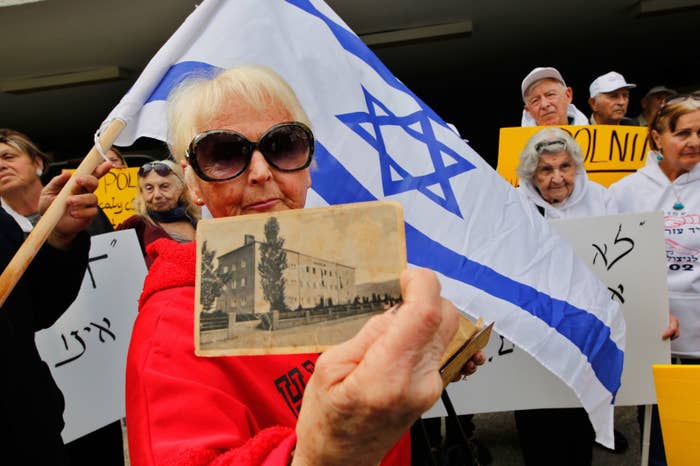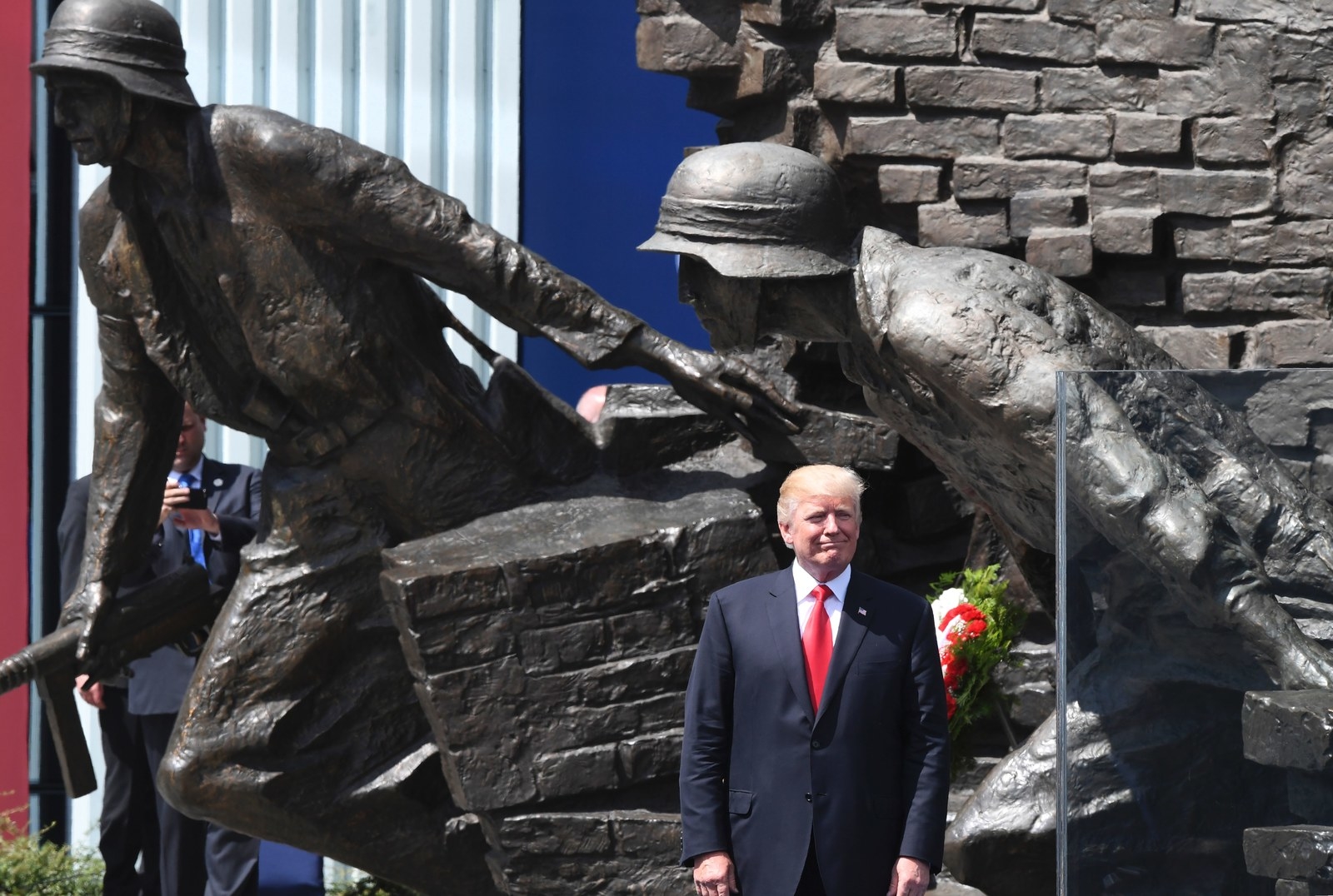
The US quietly rolled out diplomatic sanctions against Poland last month in response to the country's new Holocaust law, the Polish outlet Onet Wiadomości reported Tuesday.
Onet reported that it had obtained a memo, dated Feb. 20, that said Poland's leaders would not be allowed to meet with President Donald Trump or Vice President Mike Pence until the law was repealed.
State Department officials also reportedly warned that the US might withhold funding for joint military projects in Poland, including the stationing of US forces in the country as part of joint NATO defense efforts.
Poland has faced an intense diplomatic backlash ever since it prepared to enact the new law in February, which makes it a crime to attribute any blame to the Polish nation for the Holocaust.
A source based in Warsaw with knowledge of diplomatic discussions confirmed the Onet report to BuzzFeed News on the condition of anonymity. The US Embassy in Warsaw and the State Department did not immediately respond to messages seeking comment, nor did spokespeople for the prime minister and the ruling party.
A spokesperson for Poland’s Foreign Ministry declined to comment directly on the report, citing a policy against discussing classified material or official correspondence. But, the spokesperson said in a message to BuzzFeed News, “The Ministry of Foreign Affairs received signals that the American administration is concerned about the implementation” of the Holocaust law, though denied the US issued an ultimatum over the law. Since then, the spokesperson said, intense diplomatic talks have continued and “bilateral strategic cooperation is not threatened.”
Polish Undersecretary of Foreign Affairs Bartosz Cichocki denied the Onet report, but also said that leaking memos from US officials to the press was a crime. “Using such notes in contacts with the press is not only breaking the law and should lead to the suspension of security clearance for these people by counterintelligence, but is also proof of extreme irresponsibility,” Cichocki said during an appearance on TVN24. “It’s not true, there is no ultimatum like this. I do not understand why someone wants to rock the boat."
Separately, the Polish site WP reported Tuesday that Polish President Andrzej Duda refused to take a phone call from Secretary of State Rex Tillerson shortly before he signed the law in February. Citing a source close to Poland's prime minister, WP said Duda did not take the call because he believed Tillerson should be speaking to someone at a lower rank rather than directly to him.
BuzzFeed News could not independently confirm this account, and a request for comment from the Polish president's office was not immediately returned.

The Holocaust law, which received its first vote during Tillerson's visit to Poland on the eve of Holocaust Remembrance Day in January, is aimed at making it a crime to call facilities like Auschwitz — run by Nazi soldiers in occupied Polish territories — "Polish death camps." Many Poles feel the phrase blames them for the deaths in a war that claimed the lives of 6 million Polish citizens.
But Israeli Prime Minister Benjamin Netanyahu blasted the law as "an attempt to rewrite history," and historians and Jewish groups say it is so broadly written that it could punish anyone who discusses the multiple anti-Semitic acts committed by some Polish citizens during the war.
The warnings from the US government came following meetings in Washington, DC, between Polish diplomats and US officials including Molly Montgomery, special adviser on Europe to Vice President Pence, and A. Wess Mitchell, assistant secretary of state for European affairs.
Trump was greeted as a hero when he visited Poland last year, a trip that was seen as an endorsement for the nationalist ruling party that has flouted EU rules and refused to accept the refugees required by international agreements. Trump praised the country during his July speech in Warsaw as an example for those with “the will to defend our civilization.”

Polish officials have sent mixed signals as the furor has grown abroad over the law at home, in part because the law is very popular domestically. Onet reports that Poland's prime minister, Mateusz Morawiecki and the chairman of the ruling party, Jarosław Kaczynski, formulated the idea of freezing the law's enforcement in response to the ultimatum from the State Department.
This suspension was announced last week by Justice Minister Zbigniew Ziobro, but he was immediately contradicted by a statement from an official spokesperson for his own agency saying the law would be treated like any other duly enacted legislation.
Onet reported that State Department officials said there would be "dramatic" consequences if the law were enforced against US citizens. The report said that US officials were especially concerned that charges might be brought against the US historian Jan Tomasz Gross, who kicked off the first discussion of Poles' role in World War II atrocities with a book published in 2002 about a 1941 massacre in the town of Jedwabne.
Gross documented that a group of Poles trapped Jews in a barn and burned them alive with the tacit approval of Nazi soldiers. His work demonstrated Poles were sometimes active participants in the Holocaust, not just the victims of Nazis. Two Polish presidents issued apologies for the atrocity, which nationalists — including President Duda — have said damage Poland's "good name."
The group that helped get the law enacted, the Polish League Against Defamation, is attempting to force the Polish Justice Ministry's hand by announcing it would file a lawsuit on Friday to try to get the law enforced, using a provision that allows NGOs to sue over alleged violations. The group, which is close to powerful players inside the ruling party, said it was suing a newspaper in Argentina for using a photograph of partisans killed in 1950 for fighting the Communist regime to illustrate a story about a Polish massacre of Jews in 1941.
Several Polish news outlets reported Tuesday afternoon that the prime minister and president held an urgent meeting with the foreign minister to discuss what reporters have dubbed “a crisis” in US relations. Government spokesman Krzysztof Szczerski denied that this was the focus of the meeting, adding that it had long been scheduled. But these denials were openly mocked by some journalists.
"Some still say that there is no problem, no crisis, no personal restrictions on the part of the US, and the media came up with the matter. Unfortunately they did not," tweeted Marcin Makowski, a reporter with the outlet Do Rzeczy.

